Unit5 Topic2 A few students are running around the playground. Section D课件(共25张PPT)
文档属性
| 名称 | Unit5 Topic2 A few students are running around the playground. Section D课件(共25张PPT) |
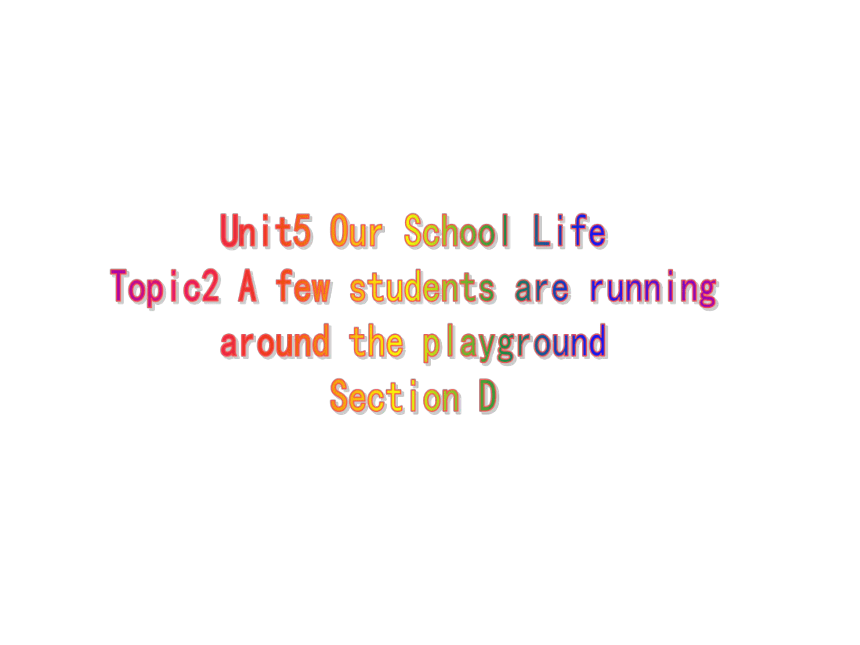
|
|
| 格式 | pptx | ||
| 文件大小 | 592.5KB | ||
| 资源类型 | 教案 | ||
| 版本资源 | 仁爱科普版 | ||
| 科目 | 英语 | ||
| 更新时间 | 2023-12-08 15:58:20 | ||
图片预览

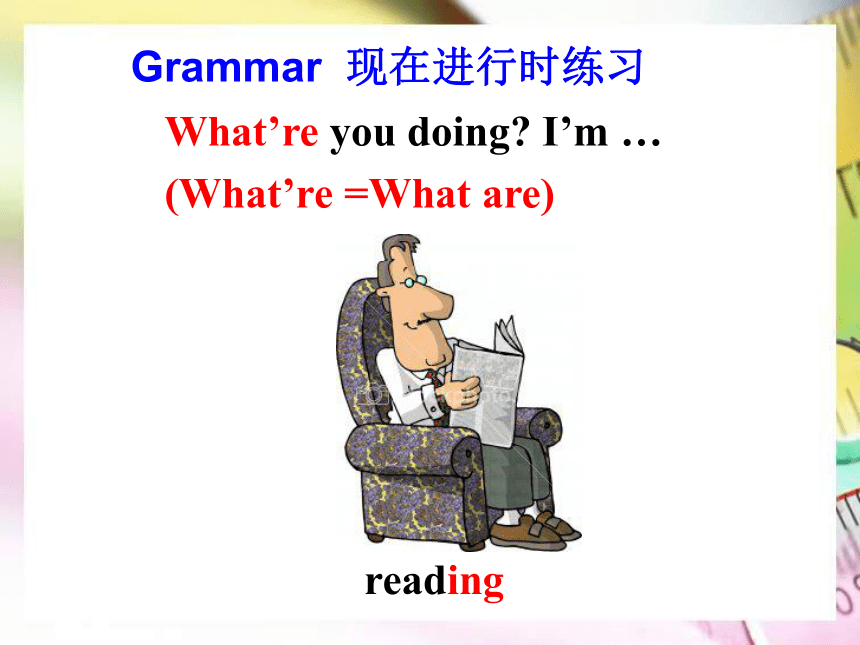
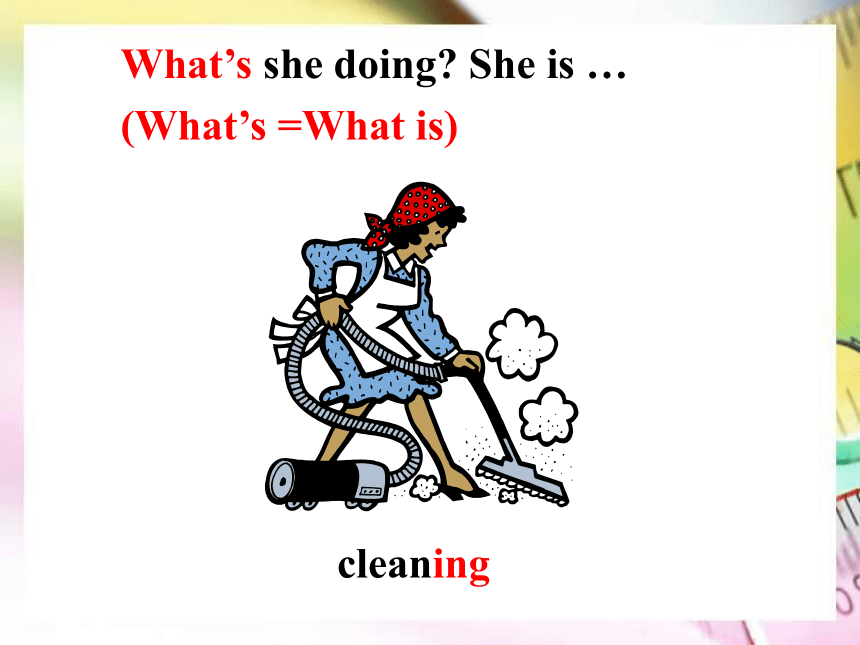
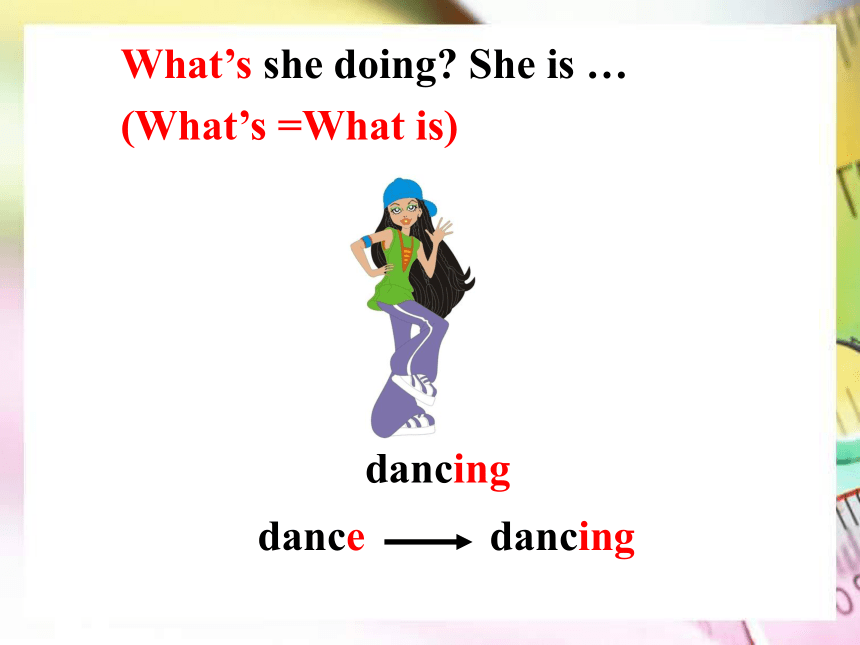
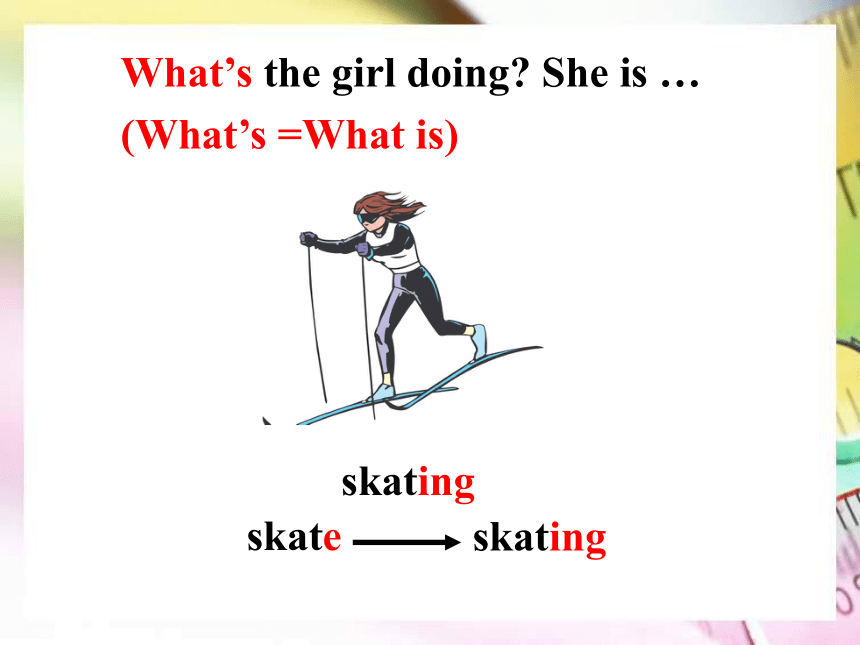
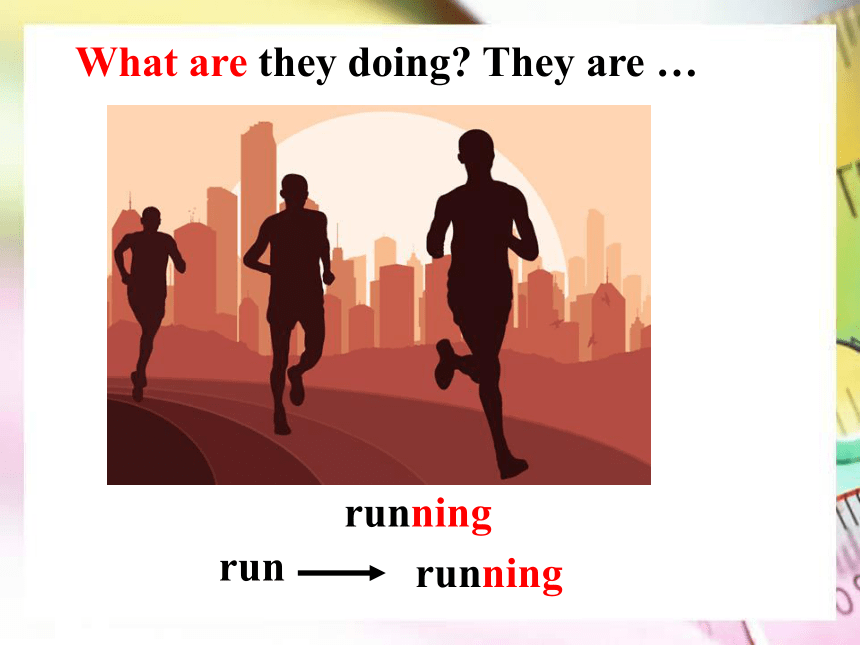
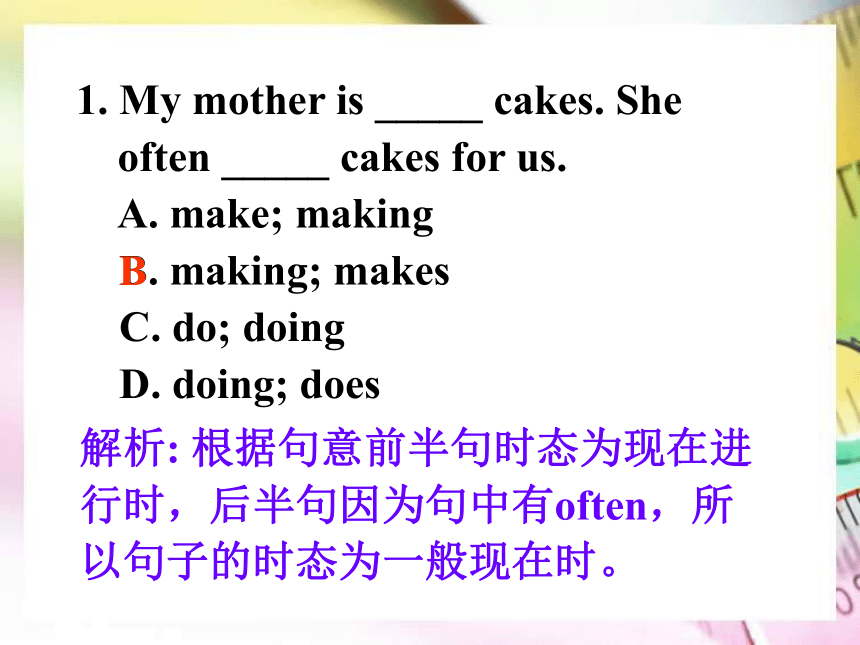
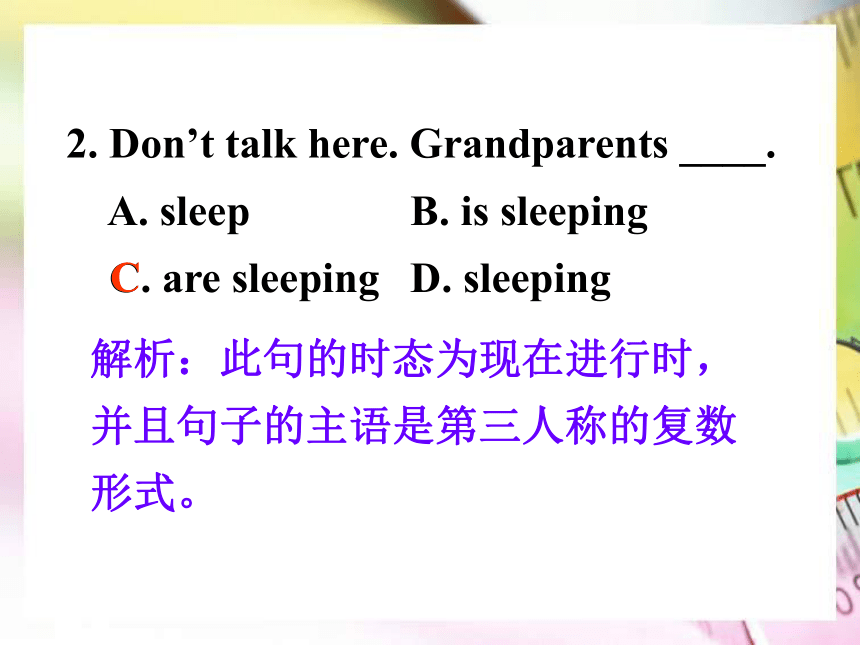
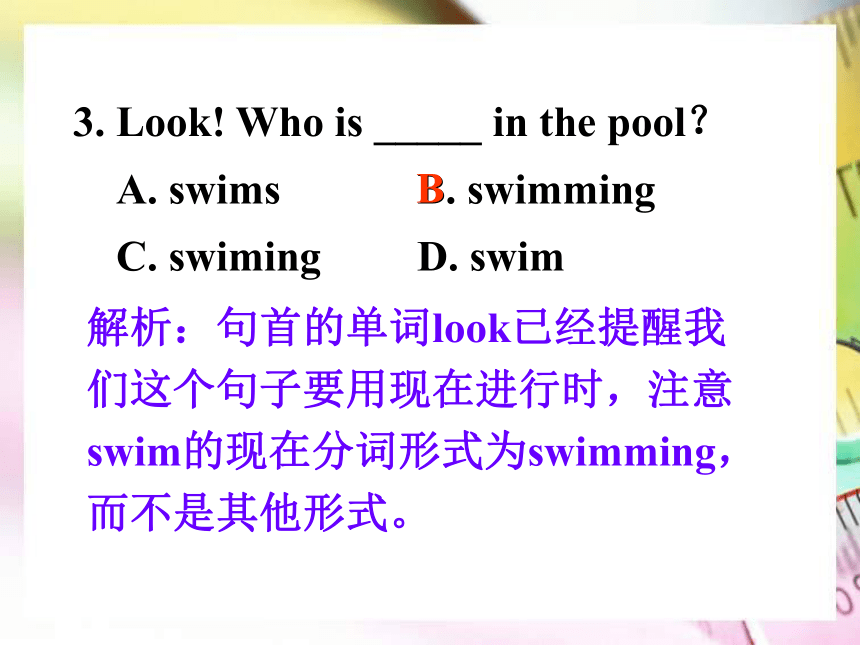
文档简介
(共25张PPT)
Unit5 Our School Life
Topic2 A few students are running
around the playground
Section D
What’re you doing I’m …
(What’re =What are)
reading
Grammar 现在进行时练习
What’s she doing She is …
(What’s =What is)
cleaning
What’s she doing She is …
(What’s =What is)
dancing
dance
dancing
What’s the girl doing She is …
(What’s =What is)
skating
skate
skating
What are they doing They are …
running
run
running
1. My mother is _____ cakes. She often _____ cakes for us.
A. make; making
B. making; makes
C. do; doing
D. doing; does
B
解析: 根据句意前半句时态为现在进行时,后半句因为句中有often,所以句子的时态为一般现在时。
2. Don’t talk here. Grandparents ____.
A. sleep B. is sleeping
C. are sleeping D. sleeping
C
解析:此句的时态为现在进行时,并且句子的主语是第三人称的复数形式。
3. Look! Who is _____ in the pool?
A. swims B. swimming
C. swiming D. swim
B
解析:句首的单词look已经提醒我们这个句子要用现在进行时,注意swim的现在分词形式为swimming,而不是其他形式。
4. Listen, someone _________ (sing)
in the classroom.
解析: 句首单词 “listen” 提醒我们
句子应该用现在进行时时态, 主语
是someone,谓语动词用单数is。
is singing
5. Ben and his sister _____________
(eat) lunch now.
解析: now常与现在进行时连用,句子的主语是两个人, 应该用are eating。
are eating now
6. are, Lisa, talking, to, who, Tim, and
(连词成句)
_____________________________
解析: 观察所给的单词确定句子的类型为特殊疑问句,因此先要找好特殊疑问词who,句子的时态是现在进行时,按照现在进行时基本的结构可以得到答案。
Who are talking to Lisa and Tom
7. They are doing their homework.
(变为一般疑问句)
____________________________
解析: 现在进行时的一般疑问句只需要把be动词提前就可以,因此在这个句子中只需把are提前就可以了。
Are they doing their homework
8. Kate is looking for her watch.
(改为否定句)
____________________________
解析: 现在进行时的否定句只需要在be动词后面直接加not就可以了。
Kate isn’t looking for her watch.
1. because作连词,意为“因为”,后接句
子表示原因。常用来回答由疑问词why
引导的特殊疑问句。
e.g. I want to eat some bread because I’m
hungry.
—Why are you going there
—Because my parents live there.
Language points
在汉语中,“因为”与“所以”经常连用,但在英语中表示因果关系的这两个词because与so不能同时在一个句子中出现。
e.g. I am going to go sightseeing because
I like travelling. = I like travelling,
so I’m going to go sightseeing.
1. 根据所给汉语意思补全英语对话。
——格林先生为什么经常看京剧
——因为他喜欢中国传统文化。
—_______ does Mr Green often see Beijing Opera
—________ he likes traditional Chinese culture.
Why
Because
2. 同义句转换。
He is going to buy a new bike because his bike is very old.
His bike is very old, ____ he is going to buy a new one.
so
2. also adv. 也, 还
also和too
◆also常位于句中,一般放在系动词、助动词或情态动词之后,实义动词之前。
e.g. My brother also likes tennis. =
My brother likes tennis, too.
我弟弟也喜欢网球。
◆too意为“也”,常位于句尾,并用逗号与句子的其他部分隔开。
e.g. I’m also very busy today. =
I’m very busy today, too.
今天我也很忙。
用also或too完成下列句子。
1. I ______ have a red pencil box.
2. Helen’ s birthday is on December 20th, _____.
also
too
3. Japanese n. 日本人;日语
adj.日本的;日本人的;日语的
Japan与Japanese
1) The girl in a red sweater is from Japan.
Japan名词,意为“日本”,指国家。
2) Can he speak Japanese
3) This boy is Japanese, and these two
girls are also Japanese.
Japanese作名词时,既可指语言,也可
以指人。我们学习过的Chinese 也有同
样的用法。当Japanese意为“日本人”
时,其单复数形式相同。
4) My father has a Japanese car.
Japanese是形容词,意为“日本的”。
I. 根据句意及首字母提示写出所缺单词。
1. We all like Helen b_______ she is a good
girl.
2. My new classmate is from Japan and
she can speak J_________.
3. Jerry is in Class Two and his brother is
a_____ in Class Two.
练习坊
Japanese
because
also
II. 将所给单词连成完整正确的句子(句末标点已给出,单词不得重复使用)。
1. reading, father, his, is, in, library, the,
__________________________________.
2. they, apple, making, juice, are
_______________________________
3. books, what, do, want, to, you, buy
__________________________________
4. basketball, Nick, playing, is, now
__________________________________.
His father is reading in the library
Are they making apple juice
What books do you want to buy
Nick is playing basketball now
Thank you!
Unit5 Our School Life
Topic2 A few students are running
around the playground
Section D
What’re you doing I’m …
(What’re =What are)
reading
Grammar 现在进行时练习
What’s she doing She is …
(What’s =What is)
cleaning
What’s she doing She is …
(What’s =What is)
dancing
dance
dancing
What’s the girl doing She is …
(What’s =What is)
skating
skate
skating
What are they doing They are …
running
run
running
1. My mother is _____ cakes. She often _____ cakes for us.
A. make; making
B. making; makes
C. do; doing
D. doing; does
B
解析: 根据句意前半句时态为现在进行时,后半句因为句中有often,所以句子的时态为一般现在时。
2. Don’t talk here. Grandparents ____.
A. sleep B. is sleeping
C. are sleeping D. sleeping
C
解析:此句的时态为现在进行时,并且句子的主语是第三人称的复数形式。
3. Look! Who is _____ in the pool?
A. swims B. swimming
C. swiming D. swim
B
解析:句首的单词look已经提醒我们这个句子要用现在进行时,注意swim的现在分词形式为swimming,而不是其他形式。
4. Listen, someone _________ (sing)
in the classroom.
解析: 句首单词 “listen” 提醒我们
句子应该用现在进行时时态, 主语
是someone,谓语动词用单数is。
is singing
5. Ben and his sister _____________
(eat) lunch now.
解析: now常与现在进行时连用,句子的主语是两个人, 应该用are eating。
are eating now
6. are, Lisa, talking, to, who, Tim, and
(连词成句)
_____________________________
解析: 观察所给的单词确定句子的类型为特殊疑问句,因此先要找好特殊疑问词who,句子的时态是现在进行时,按照现在进行时基本的结构可以得到答案。
Who are talking to Lisa and Tom
7. They are doing their homework.
(变为一般疑问句)
____________________________
解析: 现在进行时的一般疑问句只需要把be动词提前就可以,因此在这个句子中只需把are提前就可以了。
Are they doing their homework
8. Kate is looking for her watch.
(改为否定句)
____________________________
解析: 现在进行时的否定句只需要在be动词后面直接加not就可以了。
Kate isn’t looking for her watch.
1. because作连词,意为“因为”,后接句
子表示原因。常用来回答由疑问词why
引导的特殊疑问句。
e.g. I want to eat some bread because I’m
hungry.
—Why are you going there
—Because my parents live there.
Language points
在汉语中,“因为”与“所以”经常连用,但在英语中表示因果关系的这两个词because与so不能同时在一个句子中出现。
e.g. I am going to go sightseeing because
I like travelling. = I like travelling,
so I’m going to go sightseeing.
1. 根据所给汉语意思补全英语对话。
——格林先生为什么经常看京剧
——因为他喜欢中国传统文化。
—_______ does Mr Green often see Beijing Opera
—________ he likes traditional Chinese culture.
Why
Because
2. 同义句转换。
He is going to buy a new bike because his bike is very old.
His bike is very old, ____ he is going to buy a new one.
so
2. also adv. 也, 还
also和too
◆also常位于句中,一般放在系动词、助动词或情态动词之后,实义动词之前。
e.g. My brother also likes tennis. =
My brother likes tennis, too.
我弟弟也喜欢网球。
◆too意为“也”,常位于句尾,并用逗号与句子的其他部分隔开。
e.g. I’m also very busy today. =
I’m very busy today, too.
今天我也很忙。
用also或too完成下列句子。
1. I ______ have a red pencil box.
2. Helen’ s birthday is on December 20th, _____.
also
too
3. Japanese n. 日本人;日语
adj.日本的;日本人的;日语的
Japan与Japanese
1) The girl in a red sweater is from Japan.
Japan名词,意为“日本”,指国家。
2) Can he speak Japanese
3) This boy is Japanese, and these two
girls are also Japanese.
Japanese作名词时,既可指语言,也可
以指人。我们学习过的Chinese 也有同
样的用法。当Japanese意为“日本人”
时,其单复数形式相同。
4) My father has a Japanese car.
Japanese是形容词,意为“日本的”。
I. 根据句意及首字母提示写出所缺单词。
1. We all like Helen b_______ she is a good
girl.
2. My new classmate is from Japan and
she can speak J_________.
3. Jerry is in Class Two and his brother is
a_____ in Class Two.
练习坊
Japanese
because
also
II. 将所给单词连成完整正确的句子(句末标点已给出,单词不得重复使用)。
1. reading, father, his, is, in, library, the,
__________________________________.
2. they, apple, making, juice, are
_______________________________
3. books, what, do, want, to, you, buy
__________________________________
4. basketball, Nick, playing, is, now
__________________________________.
His father is reading in the library
Are they making apple juice
What books do you want to buy
Nick is playing basketball now
Thank you!
同课章节目录
- Unit 5 Our school life
- Topic 1 I usually come to school by subway.
- Topic 2 A few students are running around the play
- Topic 3 My school life is very interesting.
- Unit 6 Our local area
- Topic 1 Is there a computer in your study?
- Topic 2 My home is in an apartment building.
- Topic 3 Which is the way to the hospital?
- Review of Units 5-6
- Unit 7 The Birthday
- Topic 1 When is your birthday?
- Topic 2 Can you sing an English song?
- Topic 3 Everyone had a good time.
- Unit 8 The seasons and the Weathe
- Topic 1 What's the weather like in summer?
- Topic 2 The summer holidays are coming.
- Topic 3 Let’s celebrate!
- Review of Units 7-8
- 旧版资料
- Unit 5 Our School Life
- Unit 6 Our Local Area
- Unit 7 The Birthday
- Unit 8 The seasons and the Weathe
- Unit 7 Celebrating the Birthday(老版本)
